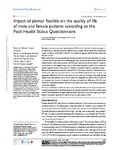Impact of plantar fasciitis on the quality of life of male and female patients according to the Foot Health Status Questionnaire

Use este enlace para citar
http://hdl.handle.net/2183/29984
Excepto si se señala otra cosa, la licencia del ítem se describe como Atribución-NoComercial 3.0 España
Colecciones
- GI-UDISAP - Artigos [196]
Metadatos
Mostrar el registro completo del ítemTítulo
Impact of plantar fasciitis on the quality of life of male and female patients according to the Foot Health Status QuestionnaireAutor(es)
Fecha
2018-04Cita bibliográfica
Palomo-López P, Becerro-de-Bengoa-Vallejo R, Losa-Iglesias ME, Rodríguez-Sanz D, Calvo-Lobo C, López-López D. Impact of plantar fasciitis on the quality of life of male and female patients according to the Foot Health Status Questionnaire. J Pain Res. 2018;11:875-880 https://doi.org/10.2147/JPR.S159918
Resumen
[Abstract] Background and purpose: Plantar fasciitis (PF) is a foot disorder in adults secondary to an inflammatory response caused by repetitive micro-trauma. We evaluated and compared the impact on quality of life (QoL) related to foot health and general health between males and females with PF.
Methods: In this cross-sectional descriptive study, patients with PF were recruited from a podiatry clinic. Physical examination, sociodemographic data, and the self-reported Foot Health Status Questionnaire (FHSQ) were recorded. The FHSQ has three sections and provides two composite scores from 0 to 100. Higher scores (close to 100) reflect better QoL related to foot health and health in general; lower scores (close to 0) denote a worse QoL related to these health items.
Results: One hundred patients (49 males [42.38 ± 14.065 years old] and 51 females [43.90 ± 14.305 years old]) were recruited. Section one of the FHSQ evaluates four foot domains, and significant differences (P<0.05) were shown for foot pain and footwear, with males having higher scores than females, but not for foot function and general foot health (P>0.05). Section two assesses four domains of general wellbeing, and significant differences (P<0.05) were shown for overall health, physical function, social capacity, and vigor, with males having higher scores than females.
Conclusion: Females with PF showed a worse health-related QoL for foot pain, foot function, footwear, and general foot health than males. A better health-related QoL was also shown for males with PF than for females with regard to general health, physical activity, social capacity, and vigor.
Palabras clave
Plantar fasciitis
Fascitis plantar
Foot health status
Salud podológica
Foot pain
Dolor en el pie
Quality of life
Calidad de vida
Fascitis plantar
Foot health status
Salud podológica
Foot pain
Dolor en el pie
Quality of life
Calidad de vida
Versión del editor
Derechos
Atribución-NoComercial 3.0 España






